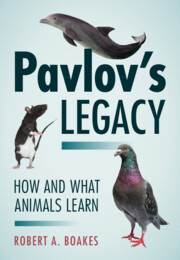
-
Select format
-
- Publisher:
- Cambridge University Press
- Publication date:
- 07 October 2023
- 05 October 2023
- ISBN:
- 9781009057530
- 9781316512074
- Dimensions:
- (244 x 170 mm)
- Weight & Pages:
- 0.8kg, 370 Pages
- Dimensions:
- Weight & Pages:
- Subjects:
- Animal Behaviour, Life Sciences, Biological Psychology, Psychology
You may already have access via personal or institutional login- Subjects:
- Animal Behaviour, Life Sciences, Biological Psychology, Psychology
Book description
Pavlov claimed that his experiments with dogs would transform the study of psychology and the treatment of mental illness. His work inspired researchers to study how animals learn to traverse mazes, avoid shocks, or press levers to obtain food, and also to compare the learning and cognitive abilities of different species, ranging from apes and dolphins to rats and pigeons. This book describes five decades of research into animal learning and comparative psychology, examining Pavlov's influence on this research and discoveries made by scientists who accepted many of his claims, while others looked for evidence to reject them. Drawing together diverse strands of research and providing historical and biographical information to bring the details to life, this is an ideal resource for graduate students and researchers in behavioural neuroscience, as well as for anyone in adjacent fields with an interest in learning theory.
Reviews
‘Pavlov’s Legacy is not merely a historical account; it is a crucial textbook for anyone in the field of psychology or behavioral science seeking to understand the genesis and evolution of ideas that continue to shape our understanding of learning.‘
Aaron P. Blaisdell Source: The Quarterly Review of Biology
Contents
Metrics
Altmetric attention score
Full text views
Full text views help Loading metrics...
Loading metrics...
* Views captured on Cambridge Core between #date#. This data will be updated every 24 hours.
Usage data cannot currently be displayed.
Accessibility standard: Unknown
Why this information is here
This section outlines the accessibility features of this content - including support for screen readers, full keyboard navigation and high-contrast display options. This may not be relevant for you.
Accessibility Information
Accessibility compliance for the PDF of this book is currently unknown and may be updated in the future.


